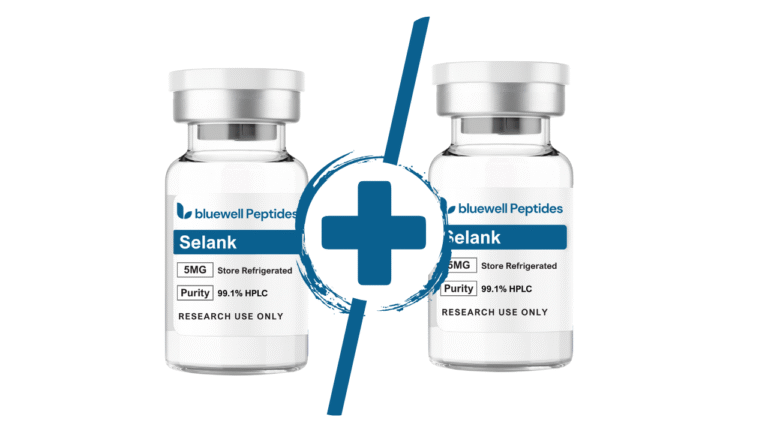Peptide-based therapies are transforming metabolic research. Tirzepatide (Mounjaro) has already proven itself as a groundbreaking dual GLP-1/GIP agonist, while Retatrutide is emerging as the “next frontier” with triple receptor activity (GLP-1, GIP, and glucagon).
But how do these two peptides compare, and what does current research reveal about their potential?
What is Tirzepatide?
Tirzepatide is a dual receptor agonist that activates both GLP-1 and GIP pathways. It is already FDA-approved for type 2 diabetes and widely studied for weight management.
How it works:
- Enhances insulin sensitivity and glucose-dependent insulin release.
- Slows gastric emptying to increase satiety.
- Reduces appetite via central nervous system pathways.
- Improves pancreatic beta-cell function.
Key findings from clinical trials:
- 15–22.5% body weight reduction in obese patients.
- A1C reduction of 2.0–2.4% in type 2 diabetes patients.
- Cardiovascular benefits, including improved markers of heart health.
- Convenient weekly subcutaneous injection (2.5mg–15mg).
🔗 Explore Tirzepatide 10mg for research use.
What is Retatrutide?
Retatrutide is a triple receptor agonist — acting on GLP-1, GIP, and glucagon receptors. By adding glucagon receptor activity, it may further boost energy expenditure and fat oxidation.
Early research highlights:
- 20–24% weight reduction in early trials.
- Strong improvements in glucose control and insulin sensitivity.
- Preferential reduction of visceral adipose tissue (harmful belly fat).
- Potential to increase metabolic flexibility.
- Like Tirzepatide, given as a weekly injection in varying strengths.
Retatrutide is still in clinical development and not yet FDA-approved.
🔗 Explore Retatrutide 10mg for research use.
Retatrutide vs Tirzepatide: Side-by-Side
| Feature | Tirzepatide | Retatrutide |
|---|---|---|
| Receptor action | GLP-1 + GIP (dual) | GLP-1 + GIP + Glucagon (triple) |
| Onset of effect | Fast appetite suppression in first weeks | Slower build-up, stronger long-term |
| Trial results | 15–22.5% weight reduction | 20–24% potential weight reduction |
| Diabetes benefits | Proven A1C reduction 2.0–2.4% | Early data, promising glucose improvements |
| FDA approval | Approved (Mounjaro) | In Phase 3 trials |
Safety & Tolerability
Both peptides share common side effects:
- Gastrointestinal (nausea, vomiting, diarrhea).
- Injection site reactions.
- Hypoglycemia risk when combined with insulin.
Retatrutide considerations:
- Limited long-term safety data (still in trials).
- Potential complexity from triple receptor targeting.
Clinical Applications
Tirzepatide may be preferred for:
- Patients with type 2 diabetes and cardiovascular risk.
- Those needing proven, FDA-approved therapy.
- Individuals with insurance access to established treatments.
Retatrutide may suit research in:
- Maximizing weight loss potential.
- Patients not achieving results with dual agonists.
- Cutting-edge studies of new incretin-based therapies.
The Future of Multi-Agonist Peptides
Both Tirzepatide and Retatrutide are part of a wider trend in peptide research:
- Oral formulations in development.
- Combination therapies with other agents.
- Extended-release versions (monthly/bi-weekly).
- Personalized dosing using genetic markers.
This is only the beginning of incretin-based peptide innovation.
Final Thoughts
- Tirzepatide offers rapid appetite suppression, proven A1C reduction, and established clinical results.
- Retatrutide promises greater long-term outcomes with triple receptor activity but takes longer to show its effects.
Both represent major breakthroughs in metabolic research, and ongoing studies will determine how Retatrutide ultimately compares.
For researchers, the best option depends on study design, goals, and timelines.
🔗 Use our free Peptide Calculator to simplify peptide measurements.
Disclaimer
All products mentioned on this website are sold strictly for research purposes only. They are not intended for human consumption, medical use, or diagnostic applications. Bluewell Peptides does not make any claims regarding treatment, prevention, or cure of any disease. Always consult published research and qualified professionals when evaluating scientific compounds.


